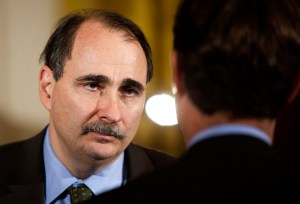
In his nearly 24 years as president of the powerful Real Estate Board of New York, Steven Spinola has rarely seen his members so riled up. “They’re saying to me, ‘You’ve got to stop this, you can’t let it happen.'”
The commotion: the Obama administration’s plan to hold its 9/11 terror trial in the federal courthouse in Lower Manhattan.
Pleading with any and every elected and government official with potential influence on the issue, including those in the White House, major landlords and other real estate moguls are scrambling to find a different trial venue. They warn that one downtown, with its security threats and streets closures, will turn Lower Manhattan into a commercial kind of no man’s land, not unlike the months after 9/11.
The business community’s battle, led by Mr. Spinola and Bill Rudin, the landlord and Association for a Better New York chairman, appears an uphill one. Thus far, the biggest New York political names with potential influence on the matter have resisted criticizing Attorney General Eric Holder’s decision to hold the trial downtown. Mayor Bloomberg and the state’s two U.S. senators have instead been focused on getting the federal government to pick up the tab, staying mostly mum, publicly, on the venue.
Mr. Spinola, no stranger to persistence, is energized.
He said he has approached three Obama administration officials about the issue since the trial location was announced, urging other locations, including Governors Island. At separate meetings and events unrelated to the trial, Mr. Spinola raised the issue with Jim Messina, deputy White House chief of staff (who said the decision rested with the Department of Justice, according to multiple attendees); Department of Homeland Security Secretary Janet Napolitano; and White House political adviser David Axelrod.
Mr. Spinola, Mr. Rudin and others have also barraged local elected officials, including members of Congress, with hopes that enough pressure will cause the Justice Department to find a new location. There is a strong, more public resistance from residents and small-business owners to hosting the trial. The community board has had numerous meetings on the topic, and residents have been vocal in pushing alternatives and engaging support from local elected officials.
“I think that there is a community of interest forming,” said Mary Ann Tighe, the chairwoman of REBNY who has been active on the issue as well. “The unintended consequence of-I’m sure-a well-intentioned thought is something that could be devastating for downtown.”
THE TRIAL OF Khalid Sheikh Mohammed and four other alleged conspirators has no set start date, but, upon its commencement, the NYPD would surround the federal courthouse on Pearl Street with a restricted-access “hard” perimeter, and a larger “soft” perimeter, with far more traffic allowed through.
The message from the business leaders, who have had little trouble wresting incentives for Lower Manhattan over the past eight years, is a simple one: move the trial anywhere else. Its effects, they say, would scare away would-be tenants from Lower Manhattan, cut off foot traffic and tourism and add another hurdle to downtown’s recovery amid a recession.
Some of the apocalyptic cries can probably be chalked up to hysterics. The soft perimeter will indeed allow traffic through, with periodic searches, and the area mostly encompasses government-occupied buildings, the tenants for which aren’t going anywhere.
Still, the disruption of traffic is a concern, as is the stigma for the larger area. Even with a complex $200 million annual security plan in place, Lower Manhattan would newly become a likely terrorism target once again. And the added perception to come that Lower Manhattan is a checkerboard of closed-off streets and security zones would only make it that much harder to attract businesses and employers.



